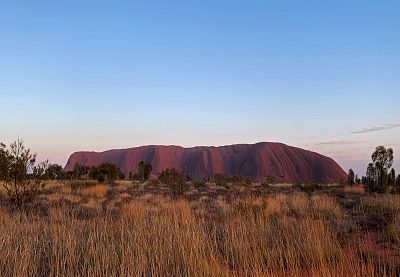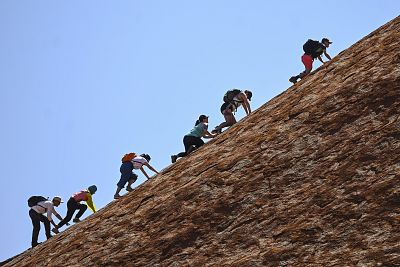The decision to ban climbing the sandstone monolith has divided both indigenous Australians as well as the wider world.
ULURU, Australia — Nature seemed to be siding with indigenous Australians' demand for Uluru to be respected as a sacred site on Friday when high winds threatened to prematurely end the generations-old tradition of climbing the sandstone monolith.Rangers warned hundreds of anxious tourists who gathered at the base of the iconic rock before dawn that they would miss their last opportunity to ever scale its 1,140-foot summit unless blustery conditions subsided.But the winds calmed and the first of around 1,000 climbers began their ascent at a chain handhold up the steep western face three hours later than scheduled. An indigenous onlooker booed them.
The ascent was permanently closed to climbers late in the afternoon, while those already on the rock had until unset to find their way down. A potential medical problem was reported with a climber but authorities could not immediately provide details.Janet Ishikawa flew from her Hawaiian home to central Australia to make the climb on the final possible day. She likened the Uluru controversy to a furor over plans to build a giant telescope on Hawaii's highest peak, which protesters consider sacred."It's a total overreaction. All of a sudden they want to take ownership of all this stuff," Ishikawa said. "They say you shouldn't climb because of all this sacred stuff. I can still respect it and climb it."The ban was a unanimous decision made two years ago by 12 members of the Uluru-Kata Tjuta National Park Board of Management. But it's an outcome that has divided both indigenous Australians as well as the wider world.The polarity of opinions has been highlighted in recent months as thousands of visitors converged on one of Australia's most famous landmarks to make a final trek to the top. Tourists have been illegally camping on roadsides for miles because the local camping ground and accommodation were booked.Sammy Wilson, who chaired the board that banned the climb, described the prohibition as a cause for celebration. Wilson is member of the Anangu tribe who are Uluru's traditional owners."If I travel to another country and there is a sacred site, an area of restricted access, I don't enter or climb it, I respect it," Wilson said. "It is the same here for Anangu. We welcome tourists here. We are not stopping tourism, just this activity."There has long been tension within the indigenous population around the money that climbers bring and the rock's significance as a sacred site."I am happy and sad, two ways," said Kevin Cooley, a resident of the Mutitjulu indigenous community in the rock's shadow who collects the Uluru tourists' garbage. He fears that tourist numbers and the local economy will decline.The biggest drop in foreign visitors could be the Japanese who have proven to be the most committed climbers. Signs around the rock have long discouraged climbing, describing Uluru as a "place of great knowledge" and noting that Anangu traditional law prohibits climbing.
The proportion of visitors who climb has been steadily declining, with more than four in five respecting the Anangu's wishes in recent years.The Anangu refer to tourists as "munga," or ants. The analogy was clearest in recent weeks with lines forming long before the climb opens at 7 a.m. each day at the base of the rock's steep western face. From there, an eclectic mix of climbers begin their ascents in narrow columns.Prominent indigenous academic Marcia Langton reacted to the stream of climbers with a tweet: "A curse will fall on all of them.""They will remember how they defiled this sacred place until they die & history will record their contempt for Aboriginal culture," Langton added.













